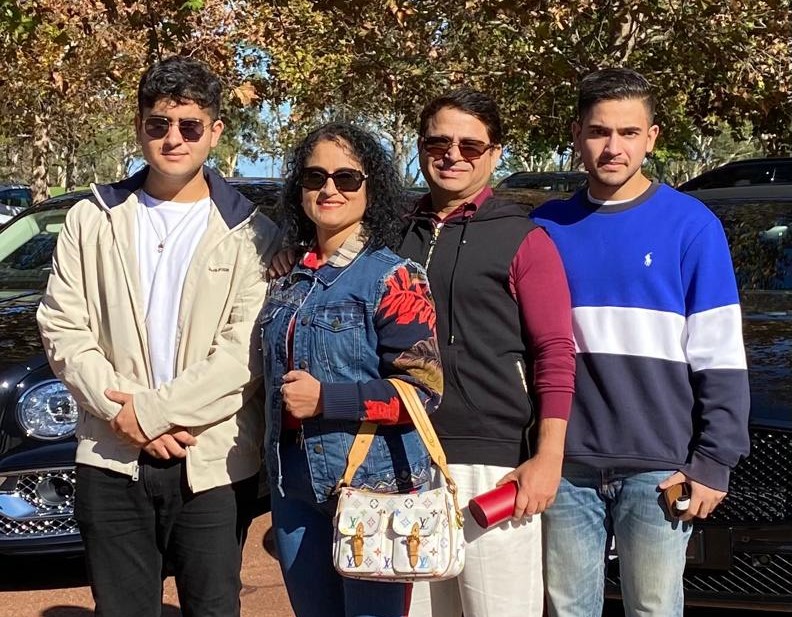The Story Board
Chapter 3: Maegha Rambal
KNOWING MAEGHA

EARLY LIFE
It’s rare enough for a woman to rise in business – after all there are more male CEOs named David then there are female CEOs. It’s even rarer still for a person of color coming from an incredibly overpopulated country to achieve even half of the things that Maegha Rambal has. And yet my impression from my first interview with her has been that she has forged through every obstacle in her path with uncommon, unwavering resolve.
Maegha grew up in the Indian State of Kashmir, which as I understand is comparable to paradise on Earth. Glittering winter snow and mild summers make this stunning area feel like a piece of Switzerland that made its way to the Indian border. Kashmir is also home to a sacred Hindu site – the Amaranth Temple – nestled deep in the side of the Himalayas. The pilgrimage to the cave can take anywhere from 20 to 60 days.
“It’s 3,888m metres off the ground, and that was hard. You know, climbing in the Himalayas, you have to go on foot, you can’t go on anything. It’s scary, because it’s a frozen glacier, it’s a mountain with a very narrow path, so you had to climb all day, all night.”

As a young girl, Maegha made this pilgrimage with her family whom she lived with in a large ancestral home, boasting four different family units of uncles, aunties and cousins.
“In India it’s more like a joint family. All of the kids, we used to all play together, communicate with each other, share our failings and thinking, everything together. At one time there were eight kids living in our house.”
ONGOING EDUCATION
While common in India, the thought of multiple families in one house was a foreign concept to me. Even more so was the casualness in which Maegha revealed her school classes had been formed in a ratio of 100 to 1. That amount of competition, when coupled with brutal barriers to entry across virtually any field of study – made it quite clear to me that only the strong survive in the Indian education system. And it’s a truth that Maegha’s parental figures were diligent in preparing her to face. Of the eight children in her household, eight of them went on to become engineers, doctors, diplomats and high-profile professionals. Such a crème-de-la-crop batch of individuals is surely a testament to the effectiveness of the family’s parenting, and the almost frightening mastery of discipline and respect they’ve instilled in their descendants. This edge led Maegha to pursue a masters in mathematics, inspired by her mathematician father. It’s also worth noting that you have a higher chance of being shot by a champagne cork than you do of being accepted to the course you want at any of the Indian Institutes of Technology.
Following graduation, Maegha knew that her best option would be a position with the central Indian government. The private sector, she explained, was incredibly difficult to break into and brought less security and lower salaries than a government job. In order to even qualify for such a position, Maegha had to pass the international Union Public Service Commission (UPSC) exam and score highly enough to be placed above the millions of other graduates who shared her ambitions. Nether less, Maegha prevailed and was appointed to an accounting position in the office of the Comptroller and Auditor General of India. Upon this success, she gave thanks to Ganesha, the elephant-headed god of wisdom and new beginnings. Faith, Maegha explained, is just a natural part of her life. There isn’t a concrete set of rules or laws to follow, but rather a set of values and principles that help explain different aspects of life and morality. These different shapes and interpretations of cosmic energy in Hinduism is a deeply personal and spiritual exploration of the self that is unique to each follower.
Blessed and purposeful, Maegha developed vital business soft-skills through her work with the Indian government, such as attention to detail, independence and leadership. Rising through the ranks, her ambition, dedication, and desire to make the world a better place by leading heart-first eventually caught the attention of Vikas Rambal. At twenty-seven, the couple was paired in a traditional arranged marriage, and in the late 1990’s, the pair travelled to several different countries seeking opportunities to realise Vikas’s vision for addressing the growing food crisis. They evaluated resources and opportunities in Canada, India, and the US, but it was ultimately Western Australia that captured their interests. Welcoming two sons in the early 2000s, the Rambal family moved to Perth. Locally known as the City of Lights, Perth is the most isolated city in the world, with its closest neighbor lying overseas in Indonesia.

Coming from Delhi, a city with a population of 23 million to a tiny city of just 2.1 million people, the Rambals began creating a life for themselves in a new country.
“Coming from India to Australia, we had to work ten times as hard to be taken seriously.” Maegha reflected. “My husband was working 18 hours a day. I was by myself with two kids, which was hard. I can’t forget that, the first year, how hard it was; explaining to our neighbour that I needed help, they would just say, “what do you mean?” They didn’t know our culture. We can’t just leave the kids, leave them crying there, I need to carry him. “Just leave him in the pram” … that’s just a totally different culture. In India I had the family support, in every aspect.”
PASSIONS AND PATHWAYS
In 2006, the family sold their share of a joint venture named Burrup Fertilisers and used that money to start their own company. They named this new venture after the Chairman’s father, Sri Perdaman Rambal, hoping it would become a vessel for the vision he, Vikas and Maegha all shared. Maegha took a step back from her professional career, wishing to dedicate more time to raising and supporting her sons. When asked about her experience balancing motherhood and career, she emphasized that her focus was on instilling the same values in her kids that had carried her through countless challenges, from discipline and diligence to respecting the wisdom and experience of their elders.
“You can’t be both, it’s not loyal to your children. You need to sacrifice a bit and instill good values. Children can lose their way and get distracted by drugs, alcohol, – you need to be there to guide them. I gave up 18 years of my career to support them and my husband, so they could become good role models and leaders like their father. So they could learn how to manage stress, and control their nerves when challenges wash over like waves.”
PERDAMAN
Once her sons had grown and moved on to university, Maegha felt it was time to rejoin the world of business – this time in Perth. In 2017, she furthered her education with relevant real estate courses in property management from Reiwa – before taking on a more active role as Director of Perdaman. Maegha found that learning about property management contributed to her leadership within Perdaman Group’s extensive property portfolio, and that connecting with the tenants gave her a tangible sense of contribution to her company and community. Her passion for the Perth community and education also led her to join the External Advisory board of Murdoch University in 2018, where she applied her management experience to further develop the university’s stakeholder relations and financing. Holistically, Maegha felt that her presence across such different facets of her business and networks created the perfect opportunity to fully develop her leadership style, and she strove to balance authority with compassion, honesty, sincerity, loyalty, hard work and care.

“I thought of my father, he was always sharing his lunch, always tipping the taxi drivers and going out of his way to show generosity and appreciation.”
From helping employees deal with the grief of losing family members, to personally driving the injured and ill to the doctor – Maegha stops at nothing to ensure her staff are cared for and treats them like family.
“It pains me if my employees are in pain. I don’t want people to feel scared or stressed, I want to be approachable to anyone needing help.” Maegha explained that she leads ‘heart-to-heart,’ and that there’s no room for inequality in her business. “I want everyone to be happy and I’ll always volunteer to mediate any problems for my people. I’m very passionate about human connection in life.”
This kind of progressive leadership culture – refreshing in contrast to traditional authoritarian models – is what Maegha has attributed to the continued loyalty and success of her employees, leading to some of Perdaman’s greatest accomplishments such as finding resources in Australia, acquiring a gas contract from Woodside and receiving government approval on a billion-dollar project. Perdaman’s urea project is as much a personal mission as it is a goal for the family business, and Maegha sees that first shipment of life-changing fertiliser in the same light as she once viewed the upper management positions in the central Indian government. Every project and contract, from processing visas to installing solar panels, from translating a passport to building a multi-billion-dollar fertiliser plant, is part of a personal mission backed up by years of devotion and a genuine desire to create a better tomorrow.
Once the urea project has gotten off the ground, Maegha hopes to direct her attention homewards and turn Perdaman’s pharmaceutical manufacturing business in India into an international supplier providing medicine for the world. Perdaman is on the cusp of a whole new era, and after decades of hard work, Maegha is excited to see the collective efforts of her family’s painstaking efforts pay off.

Download the free ebook on The Personal Philosophy of Maegha Rambal, an inside look into the tips and mindset of Perdaman’s Director.
Maegha’s story continues, as do all the other stories that make up Perdaman’s diverse and ever-changing identity. The wisdom, leadership and empathy of Maegha Rambal contribute every day to the heart of Perdaman, but there are many more voices and minds that help shape this company. We are all a part of each other’s story now, working together to make our next chapter a better tomorrow.

